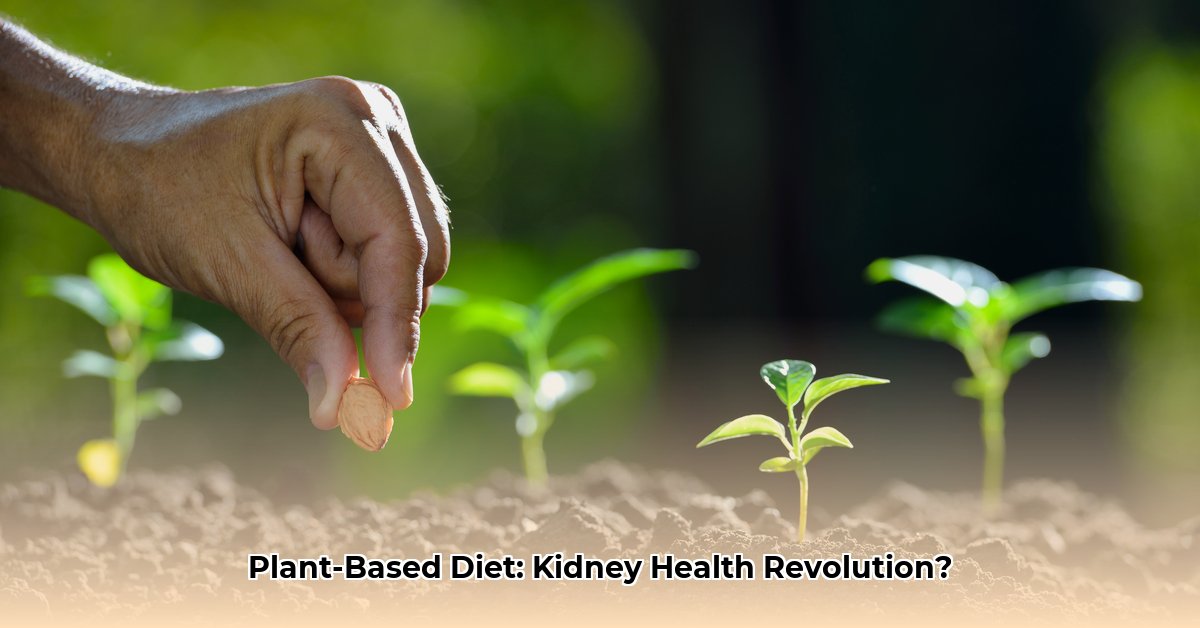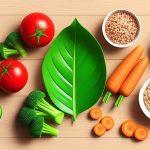Living with chronic kidney disease (CKD) can feel overwhelming, but it doesn’t have to define your life. A well-planned plant-based diet can be a powerful tool for supporting kidney health and improving your overall well-being. For a structured approach, check out this 30-day meal plan. This guide provides you with the information and practical steps you need to navigate the world of plant-based eating with CKD, empowering you to make informed choices and work collaboratively with your healthcare team. It covers the benefits a plant-based diet can offer for CKD, addresses common concerns about potassium and phosphorus, and provides a clear, actionable plan – with guidance from experts – to help you sustain a healthy, plant-based lifestyle long-term. You’ll discover evidence-based strategies to help slow down the progression of CKD and learn how plants can support your kidney health. This guide is designed to help you take control, working closely with your doctor and a registered dietitian, to improve your kidney health and live a fuller, more vibrant life.
Understanding the Connection Between Diet and Kidney Health
Chronic kidney disease (CKD) affects millions, leading to a gradual decline in kidney function. Your diet significantly impacts how well your kidneys work, and research increasingly highlights the protective and supportive role of plant-based foods. Beyond simply being “good for you,” incorporating plenty of vibrant fruits, colorful vegetables, and hearty whole grains can actively benefit kidney health. Here’s why:
- Fiber’s Crucial Role: Fiber, abundant in plant-based foods, helps regulate blood sugar and cholesterol levels, both critical risk factors in CKD progression. Fiber also promotes healthy digestion, reducing the overall burden on your body.
- Antioxidants: Nature’s Protectors: Plants are packed with antioxidants, which combat inflammation. Chronic inflammation contributes to kidney damage, making antioxidants valuable allies in protecting kidney function.
- Reducing Kidney Workload: Reducing your intake of animal protein lessens the workload on your kidneys. Processing animal protein requires more effort from your kidneys compared to plant-based protein. The aim isn’t necessarily to eliminate meat entirely, but rather to achieve a healthier, more sustainable balance.
- Blood Pressure Regulation: A plant-based diet can contribute to healthy blood pressure. High blood pressure is a major contributor to CKD progression, so maintaining optimal levels is key.
Addressing Concerns About Plant-Based Diets and Kidney Function
It’s natural to have questions and concerns when considering a significant dietary change, especially with a condition like CKD. Here’s a breakdown of common worries and how to address them:
- Potassium: High potassium levels can be dangerous for individuals with CKD. However, a well-planned plant-based diet can easily accommodate this concern. The key is mindful portion control and prioritizing lower-potassium fruits and vegetables. Consulting with a registered dietitian (RD) can provide personalized guidance.
- Phosphorus: Phosphorus is another mineral that requires careful monitoring. Some plant-based foods are higher in phosphorus than others. Working with an RD is essential to create a personalized eating plan that balances phosphorus intake with your individual needs.
- Protein: While reducing overall protein intake is often beneficial in CKD, ensuring adequate protein intake is still important. A plant-based diet can provide sufficient protein through sources like legumes, tofu, nuts, and seeds. Your RD can help you determine the appropriate protein intake for your specific situation.
Remember, a registered dietitian specializing in renal nutrition is your best resource for navigating these concerns and creating a safe and effective plant-based diet plan.
Building a Successful Plant-Based Diet for Kidney Health: A Step-by-Step Guide
Transitioning to a plant-based diet for kidney health requires a thoughtful and gradual approach:
- Consult a Registered Dietitian (RD): This is the most crucial initial step. An RD specializing in renal nutrition will develop a personalized diet plan tailored to your specific CKD stage, lab results, medical history, and personal preferences.
- Make Gradual Changes: Avoid drastic overnight changes. Slowly incorporate more plant-based foods into your meals over time. This approach promotes sustainability and makes the transition more manageable.
- Embrace Variety: Include a wide array of fruits, vegetables, legumes (beans, lentils), and whole grains. This ensures you receive a broad spectrum of essential nutrients.
- Prioritize Fiber-Rich Foods: Fiber supports healthy digestion and helps stabilize blood sugar and cholesterol levels, all beneficial for kidney health.
- Monitor Potassium and Phosphorus Levels: Regularly check your potassium and phosphorus levels with your doctor. This allows for necessary dietary adjustments based on your body’s response.
- Stay Hydrated: Drink plenty of water throughout the day. Adequate hydration aids your kidneys in efficiently flushing out waste products.
- Limit Processed Foods and Added Sugars: These foods often place unnecessary stress on your kidneys and provide minimal nutritional value.
- Choose Plant-Based Protein Wisely: Recognize that plant-based proteins vary in their phosphorus and potassium content. Legumes, tofu, and nuts offer diverse nutritional profiles. Your RD can guide you in selecting the most suitable sources and portions.
- Track Your Progress: Keep a food diary to monitor your intake and identify any patterns, facilitating informed adjustments to your diet plan.
- Read Labels Carefully: Pay close attention to sodium content in packaged and processed plant-based foods. Opt for low-sodium options whenever possible.
The Potential Benefits of a Plant-Based Approach for Kidney Disease
A well-planned plant-based diet can offer significant advantages for people with CKD, supported by a growing body of research:
- Improved Blood Pressure: Plant-based diets have been shown to help lower blood pressure, a critical factor in managing CKD.
- Reduced Inflammation: The antioxidants in plant foods can help reduce inflammation in the body, potentially slowing CKD progression.
- Better Blood Sugar Control: Plant-based diets, rich in fiber, can help regulate blood sugar levels, which is crucial for individuals with CKD, especially those with diabetes.
- Reduced Uremic Toxins: Studies suggest that plant-based diets can help reduce the production of uremic toxins, harmful substances that build up in the blood when kidney function declines.
- Improved Gut Health: Plant-based diets promote a healthy gut microbiome, which can positively impact overall health and potentially reduce inflammation.
These benefits can translate into a better quality of life, with more energy, fewer symptoms, and improved overall well-being.
Potential Challenges and How to Overcome Them
A dietary shift may present challenges. These might include finding appealing and creative recipes, managing cravings for familiar foods, and navigating social situations where your diet differs from others. Remember that your registered dietitian is there to provide ongoing support, guidance, and kidney-friendly recipes. Don’t hesitate to reach out with questions or concerns.
Moving Forward with Confidence: Your Personalized Journey
This guide provides general information, but remember that everyone’s journey with CKD is unique. Collaborate closely with your healthcare team, empowering yourself to make informed choices that improve your health and well-being.
Best Plant-Based Diet Plan for Managing Chronic Kidney Disease
Key Takeaways:
- A well-planned plant-based diet can offer health benefits for individuals with chronic kidney disease (CKD), potentially slowing disease progression and reducing cardiovascular risks, but requires careful management and monitoring.
- Careful monitoring of potassium, phosphorus, and sodium intake is crucial due to the levels found in some plant-based foods.
- Meticulous meal planning, portion control, and regular collaboration with your nephrologist and a registered dietitian are essential.
- Transitioning to a plant-based diet should be gradual, personalized, and closely monitored to ensure safety and effectiveness.
Understanding the Challenges and Benefits
A plant-based eating can be extremely beneficial for people with CKD, but it’s not one-size-fits-all.
The biggest hurdles are managing potassium, phosphorus and sodium. These minerals can build up to dangerous levels in people with impaired kidney function. Many plant foods are high in potassium (bananas, potatoes, tomatoes, spinach) and phosphorus (dairy substitutes, nuts, seeds, whole grains). Careful meal planning is key. Sodium is another concern; many processed plant-based substitutes are high in it.
However, the potential upsides are substantial. Plant-based diets are often lower in protein, which can be vital for slowing the progression of CKD. They’re also rich in fiber, vitamins, and antioxidants, promoting overall health. Reduced inflammation, improved blood pressure, and better blood sugar control are common benefits.
Crafting Your Personalized Plan
Transitioning requires a strategic and incremental approach. Start by making one or two plant-based swaps per week. Instead of meat-based meals, try lentil soup, tofu stir-fries, or black bean burgers. Get creative with herbs and spices to enhance flavor without adding excess salt.
Here’s a sample day of kidney-friendly, mostly plant-based eating:
- Breakfast: Oatmeal with berries and a sprinkle of chia seeds
- Lunch: Large salad with mixed greens, cucumber, bell peppers, and a lemon-tahini dressing
- Dinner: Roasted vegetables (broccoli, carrots, cauliflower) with baked tofu and quinoa
This is just a template, and a registered dietitian can create something more tailored to your needs. Be sure to consult with one to ensure your specific dietary needs are met.
- How To Stop Thinking About Food And Silence Food Noise - February 3, 2026
- Why Am I Always Thinking About Food? Your Body and Brain Explain - February 2, 2026
- Healthy Eating Is About Quality, Not Just Calories - February 1, 2026










